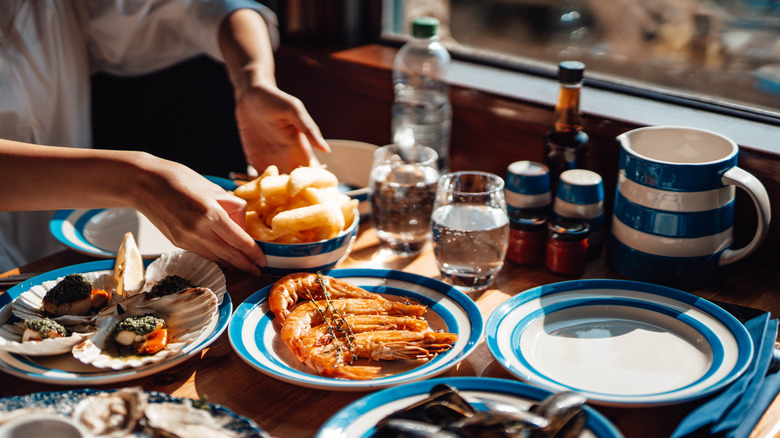A Common Etiquette Rule Tourists Often Break While Dining In Europe
Wherever you're traveling in Europe — from beautiful Italian cities to Portuguese hiking destinations — sampling the cuisine is an important part of immersing yourself in the local culture. Equally important is learning about and following local dining etiquette to ensure you're not inadvertently committing a faux pas and offending your hosts, servers, or restaurateurs. In France, that means not eating while walking around, and instead taking time to sit down to enjoy your food. Norwegians always use two utensils for every meal, no matter what's on the menu. It's impolite in Britain to clink your cup with your spoon during teatime.
In some countries, local residents are taken aback if tourists ask for salt and pepper. In others, rushing through a meal is considered rude. One common custom across Europe is not leaving any food on your plate at the end of a meal. While leaving food behind isn't typically considered to be a gaffe in the United States, it can signal to people in European countries that you didn't enjoy your meal.
Avoid a dining blunder
Cleaning your plate while traveling in Europe will help you avoid offending locals, a piece of etiquette that rings especially true in Germany. While visiting the country, it's a best practice to eat everything in front of you, not only because it signals to your host that you enjoyed your food but also because Germans consider it wasteful to not finish your plate.
Asking for a second helping of food in Germany isn't rude. In fact, the culture is hospitable, and hosts usually offer refills of food and drinks. However, if you're going for seconds, make sure you can finish. "Don't take more than you can eat," The German Way and More blog warns. The same is true in Spain, where leaving food behind isn't viewed as rude to your hosts, but is perceived as wasteful.
And while cleaning your plate is polite across Europe, it's viewed as disrespectful in other parts of the world. In China, for example, eating all of your food communicates to the hosts that they did not provide enough to eat.

